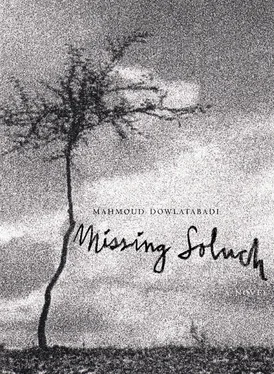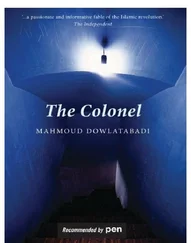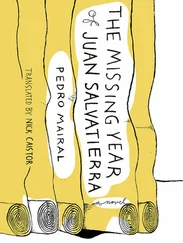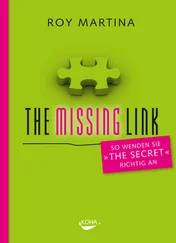At times, one may be love personified. One may personify love just by being. By coming and going, by looking at the world. Love can be in one’s hands and heart, boil in you, without allowing you to recognize its footprints. Without your understanding where it entered into you, how it grew within you. At times, it’s better not to know. Perhaps you would want to know, yet also don’t want to, or can’t know. Sometimes love is simply that washed-out memory of Soluch and your mud-covered hands as you whitewash the walls. Perhaps love is Mergan herself! Love is evident and hidden at once. At times it excites; at times its pain throws you into a well.
So, is it Soluch? Is he the well that Mergan’s been thrown into? Where is Soluch? It’s the New Year, the holiday. It’s that time when people of all kinds and classes drag themselves back to their homes, sitting around the tablecloth and, with whatever means are available to them, making an effort to enjoy one moment as special and different from the rest of the year. And where’s Soluch? Where could he be? In the foothills of Shahrud? What could he be doing in a coalmine?
Is Soluch in the mines of Shahrud?
Mergan knew her brother all too well. Molla Aman could tell a hundred stories without your knowing which of them was untrue. Could it be that he’d make up a lie to comfort Mergan? His own nature was that he couldn’t thrive in an air of gloom or depression. Perhaps he didn’t want to spend even one night at his sister’s side commiserating and cradling her sorrow in vain. Maybe he only hoped to bring some fresh air into their dark, silent home.
But where is Soluch now?
“Ah, Madam Mergan, how are you?”
It was Karbalai Doshanbeh, Zahra’s and Zabihollah’s uncle. He filled the doorway with his stocky, short frame, holding himself up with a hand against the wall. He held a lamb’s collar in one hand, while his self-satisfied smile brought creases to the edges of his eyes. Mergan recognized his voice and without turning — and not because she couldn’t — greeted him back. He stepped into the room and placed his hands behind his lower back and looked at the walls and ceiling.
“It’s truly the work of a genius! Never before have I seen a woman capable of this kind of hard work. Bravo …! May my neck break for having broken my own woman like a piece of glassware … Bravo, Mergan!”
The sound of Karbalai Doshanbeh was soft and melodious, with an edge of sarcasm mixed with his perpetual self-satisfaction. In the resonance of his words a kind of presumption rang out, and that was the superiority of Karbalai Doshanbeh and his family. He had a kind of tribal chauvinism, and so did all the members of his family. Even if hunger were to bring them to their last breath, still the arrogant echo would remain which, in and of itself, mocked and ridiculed all others. This was the case with all of them, both woman and man. They were demanding, insulting. It was as if each of them had hung a veil of arrogance on their faces beforehand, so that all of their deeds and sayings would be marked by it.
Mergan was well acquainted with Karbalai Doshanbeh’s nature and disposition. So even when she was the subject of his admiration and esteem, she could not help but sense the poisonous barbs that effortlessly dripped from his tongue and that were wrapped into every word. But she didn’t care. As far as Mergan was concerned, all this was old and unremarkable. Mergan imagined herself as a hedgehog that as soon as it senses an attack turns into a ball made up entirely of sharp needles. No animal is able to penetrate its defense. Mergan was thus made up of several different personas, and whenever needed, a different one would appear and face the world. At this moment, Mergan was a hedgehog. And none of the other personas wanted to give any notice to Karbalai Doshanbeh, saying to herself, “He can go to hell! I’m working, earning a wage!”
But Karbalai Doshanbeh was not dissuaded. “I’ve heard the happy news that you’re giving your daughter’s hand in marriage?”
“Oh … we’ll see what God wants.”
“God only wants good. If the deed is good, God will place no obstacle before you. And praise Him, she’s really grown up!”
“It’s in your kind eyes, Karbalai. Hajer is like your own servant.”
Karbalai Doshanbeh turned and made a semi-circle, looking for a spot to sit down. There was nowhere to sit but in the doorway. He lifted the hem of his cloak and sat on the ground, set a shoulder against a wall, and brought his worry beads out from his pocket. He fingered the tiny beads with his short, thick digits. His lamb had come closer to him and was chewing on a bit of cloth torn from his cloak’s shoulder.
“Did Zahra bring you something to drink?”
“Yes, Karbalai. She brought us tea.”
He extricated two raisins from his pocket and placed them on his tongue, saying, “Your children must have delivered my message to you, Mergan! I had said that if you have any needs, just let me know. After all, I have a bit of my own to share. We would come to terms easily. You’d be dealt with as a close friend. I don’t need any collateral from you, since you yourself are worth a good hundred ashrafis to me!”
“May God not reduce your greatness, Karbalai. But with His help, we’ve survived the worst of the winter.”
“Well, all I’m saying is that I’m not the kind to make hollow promises … No news from that worthless man of yours, Soluch, eh?”
“Oh yes, I have news from him. He’s busy with work out near Shahrud. In the mines.”
“It’s a lie! All of it! They’re putting you on. If you want my opinion, you should just consider Soluch as gone. He never had the strength and foundation to bear living away from here, much less so during the winter, with nothing to his name. He’d have gone mad, the poor fool. Who’s heard of a sensible man doing such a thing? In the darkness of winter! To leave from here then! I lived far away for some time, even as a prisoner. Six terrible years; everyone here knows about it. But returning in one piece is not something just anyone can do. Not that poor wretched Soluch; he could barely survive even while here. He’d sucked the marrow from his life already, the pathetic soul. He could hardly walk. He was dragging his legs behind himself as he went!”
If the conversation had ended right here, and Karbalai Doshanbeh had descended off his podium to go take care of his own business, perhaps Mergan would have been able to just take in all he said and not react. But he couldn’t give up there. He’d found a foil for himself. He was sitting in his nephew’s house, preaching to a woman whose hands and hair and face were covered in mud. It was as if he was intending to reach in and empty Mergan’s heart simply through his oration. Mergan was trapped and didn’t know what to do. Should she respond? Of course, if she could … but how?
“Karbalai, it’s never good to speak of one who’s not present.”
Karbalai Doshanbeh responded with a sincerity verging on insolence.
“You mean, to speak of the dead!”
Mergan softly and painfully said, “What in the world had Soluch ever done to you?”
“Oh, nothing, nothing. I never saw ill from him. He was always truthful in his business. But we didn’t know he was planning to leave. But the day before he left, he came to our Salar Abdullah and told him to come and settle his accounts by taking some pieces of copper work. But no, he was always honest in his dealings.”
“Good. So why do you speak ill of him, then?”
“So you want me to sing the praises of such a man? Hardly even a man! Ha! In whose care did he leave his young wife before going? In whose care? In the care of the wind of the plains? How am I to speak of such a person? Isn’t this just what he deserves? Do you even know what this means?”
Читать дальше












